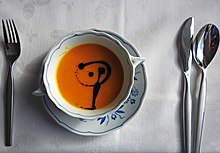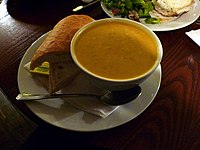 A bowl of pumpkin cream soup | |
| Type | Soup |
|---|---|
| Serving temperature | Hot or cold |
| Main ingredients | Pumpkin, broth or stock |
Pumpkin soup is a usually 'bound' (thick) soup made from a purée of pumpkin. It is made by combining the meat of a blended pumpkin with broth or stock.[1] It can be served hot or cold, and is a common Thanksgiving dish in the United States. Various versions of the dish are known in many European countries, the United States and other areas of North America, in Asia and in Australia. Pumpkin soup was a staple for the prisoners of war in North Vietnamese prison camps during the Vietnam War.[2]
Squash soup is a soup prepared using squash as a primary ingredient. Squash used to prepare the soup commonly includes acorn and butternut squash.[3][4]
Preparation
[edit]Squash that has initially been separately roasted can be used in soup preparation.[4] The roasting of squash can serve to concentrate the gourd's flavor.[4] Squash soup can be prepared with chunks or pieces of squash and also with puréed squash.[5][1] Pre-cooked, frozen squash can also be used,[6] as can commercially prepared packets of pre-cooked frozen squash purée.[7] Butternut squash soup may have a sweet flavor, due to the sugars present in the squash.[6] Additional basic ingredients in squash soup's preparation can include broth, onion, cream, spices such as sage and thyme, salt and pepper.[7] Other recipes have been known to include split peas and more exotic spices such as cumin and cinnamon.[8] Pumpkin soup can be served hot or cold, and is a popular Thanksgiving dish in the United States.[9]
History
[edit]A variety of pumpkin soup originated in Haiti during their independence. Designed to be a statement to french colonists that the Haitian people could work together to create something. The traditional version of pumpkin soup is called Soup joumou.
Pumpkin "pies" made by early American colonists had more similarities to being a savory soup served in a pumpkin[10] than a sweet custard in a crust.
Pumpkin soup was a staple for the prisoners of war in North Vietnamese prison camps during the Vietnam War.[2]
Squash soup is a soup in African cuisine. It is a part of the cuisine of Northern Africa,[11] and the cuisines of Mozambique[12] and Namibia,[3][13] both of which are located in Southern Africa. Squash soup is also served in other countries and is a part of other cuisines. Soup Joumou is traditionally consumed in Haiti on New Year's Day (January 1), as a historical tribute to Haitian independence in 1804.[citation needed]
Gallery
[edit]-
Pumpkin soup
-
Squash soup
-
Roasted butternut squash soup
-
Tomato pumpkin soup
-
Styrian pumpkin soup always served with pumpkin seed oil
See also
[edit]References
[edit]- ^ a b Bittman, Mark (1997-10-15). "The Minimalist; A Pumpkin Soup for Fall: It's Almost Too Easy". The New York Times. Retrieved 2008-10-23.
- ^ a b Maurer, Harry (1998). Strange Ground: An Oral History of Americans in Vietnam, 1945–1975. Da Capo Press. p. 415. ISBN 978-0-306-80839-5.
- ^ a b Long, L.M. (2016). Ethnic American Cooking: Recipes for Living in a New World. Rowman & Littlefield Publishers. p. 203. ISBN 978-1-4422-6734-3.
- ^ a b c Soup. DK Publishing. 2009. p. 176. ISBN 978-0-7566-6549-4.
- ^ All-Time Best Soups. America's Test Kitchen. 2016. p. 126. ISBN 978-1-940352-80-0. Retrieved September 22, 2016.
- ^ a b Hensperger, B.; Kaufmann, J. (2007). Not Your Mother's Slow Cooker Recipes for Two. Not Your Mother's. Harvard Common Press. p. 26. ISBN 978-1-55832-341-4.
- ^ a b Stone, M. (2014). The Slow Cooker Soup Cookbook: Easy Slow-Cooker Soup Recipes. Soup Cookbook. Martha Stone. p. 9. ISBN 978-1-310-48947-1.
- ^ Studio, Kylie-Curated Life (2021-05-12). "Spiced Pumpkin and Split Pea Soup (GF, Vegan)". Curated Life Studio. Retrieved 2021-06-30.
- ^ "Pumpkin Soup". Mahalo.com. Archived from the original on October 21, 2008. Retrieved 2008-10-23.
- ^ "American Classic IX: Pumpkin Pie". Good Eats.
- ^ Garratt, N. (2013). Mango and Mint: Arabian, Indian, and North African Inspired Vegan Cuisine. Tofu Hound Press. PM Press. p. 46. ISBN 978-1-60486-323-9.
- ^ Vos, H. (2010). Passion of a Foodie - An International Kitchen Companion. Strategic Book Publishing & Rights Agency (SBPRA). p. 446. ISBN 978-1-934925-63-8.
- ^ Hultman, T.; Service, Africa News (1986). The Africa News cookbook: African cooking for Western kitchens. Cookbook Series. Penguin. p. 21.
Further reading
[edit]- Rombauer, I.S.; Becker, M.R.; Becker, E.; Guarnaschelli, M. (1997). JOC All New Rev. - 1997. Scribner. p. 94. ISBN 978-0-684-81870-2.
| Species | |||||||
|---|---|---|---|---|---|---|---|
| Cultivars |
| ||||||
| Related topics |
| ||||||





